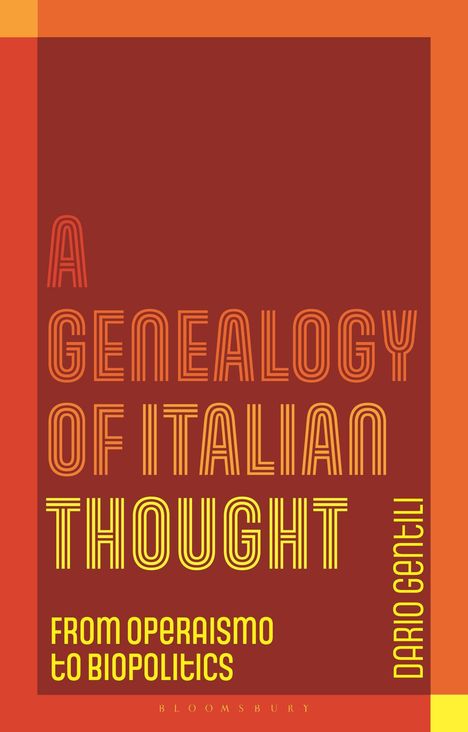Dario Gentili: A Genealogy of Italian Thought, Gebunden
A Genealogy of Italian Thought
- From Operaismo to Biopolitics
Sie können den Titel schon jetzt bestellen. Versand an Sie erfolgt gleich nach Verfügbarkeit.
- Verlag:
- Bloomsbury Publishing PLC, 07/2026
- Einband:
- Gebunden
- Sprache:
- Englisch
- ISBN-13:
- 9781350463585
- Artikelnummer:
- 12512351
- Umfang:
- 224 Seiten
- Erscheinungstermin:
- 9.7.2026
- Hinweis
-
Achtung: Artikel ist nicht in deutscher Sprache!
Weitere Ausgaben von A Genealogy of Italian Thought |
Preis |
|---|---|
| Buch, Kartoniert / Broschiert, Englisch | EUR 28,71* |
Klappentext
Dario Gentili analyses the genesis of Italian Thought through the history of the political and theoretical conflicts in Italy from the 1960s to the present, from Gramscianism to operaismo to biopolitics.
Covering well-known thinkers such as Agamben, Negri, and Esposito as well as those less familiar to English speaking audiences, including Tronti, Cacciari and Marramao, this is an essential book for anyone seeking to understand the development of critical thought in Italy.
A Genealogy of Italian Thought elucidates the persistence of fundamental concerns that tie together the Italian left's post-war break with the communist party, the analysis of post-Fordist labour in the 1970s and 1980s, the politics of sexual difference, the postmodernism of 'weak thought', up to the current debate on post-Covid-19 biopolitics. Following decade by decade thinkers central to Italian Thought, the book shows how the development of these theoretical strains is deeply intertwined with Italian history. Understanding conflicts, struggles, polemics, and ruptures as the leading motifs of Italian Thought, Gentili demonstrates how philosophical and political reflection born within a branch of heretical Western Marxism (operaismo) would later see its exponents take different paths: some in the recovery of political theology, others in an original approach to biopolitics.
The chronological approach will help to orient readers new to recent Italian philosophy and history; at the same time, the book will appeal to advanced readers with a fresh critical perspective on the coherence of Italian Thought. An updated final chapter takes the history up to the present day, following the topics and fault-lines that have emerged since the book's 2012 publication in Italian.


